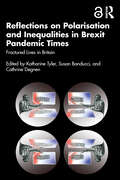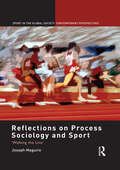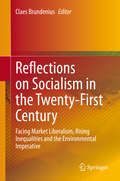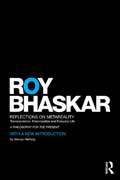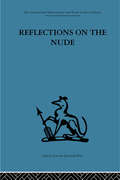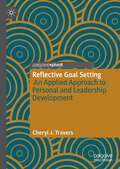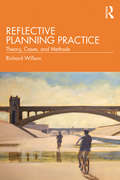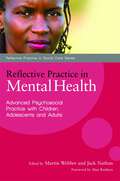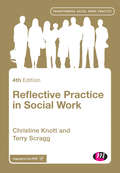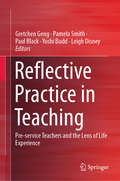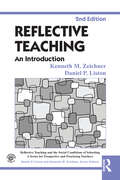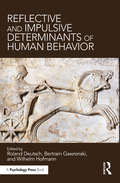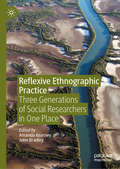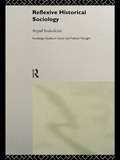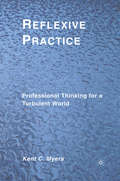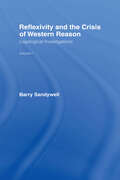- Table View
- List View
Reflections on Polarisation and Inequalities in Brexit Pandemic Times: Fractured Lives in Britain
by Katharine Tyler Cathrine Degnen Susan BanducciThis is the first interdisciplinary edited collection that examines the manifestation of social inequalities and polarisations in Britain throughout the dual crises of the Brexit vote and the Covid-19 pandemic. The volume demonstrates that Brexit and the pandemic are not self-contained events but rather are major ongoing processes that have impacted all aspects of British social and political life. Drawing on an array of empirical case studies conducted in the wake of the Brexit vote and during pandemic lockdowns, chapters trace how these processes illuminate, consolidate, and amplify existing and entrenched social inequalities and polarisations that shape the fabric of British society, including racial, ethnic, class, migrant, national, and gendered inequalities.The volume is divided into three parts centred on (a) the nation; (b) the community; and (c) the media. Each section draws on diverse analytical frameworks and methodological approaches from across the social sciences, arts, and humanities to provide empirically grounded critiques of reductive media-led narratives with the goal of accounting for and explaining the reproduction of social inequalities and emergence of polarisations in these Brexit pandemic times. In so doing, the case studies include critical analysis of lockdown novels; the speeches of political elites from across the political spectrum; ‘ordinary’ people’s everyday traditional and social media practices; as well as their opinions based on the findings of large-scale surveys and in-depth place-based ethnographic fieldwork conducted across rural, urban, and suburban areas of England. Each chapter also includes artwork by contemporary artist Helen Snell that complements, develops, and extends the book’s core themes and arguments.This collection will be insightful reading for students and academics across the social sciences, arts, and humanities (especially from the disciplines of sociology, politics, social anthropology, human geography, sociolinguistics, contemporary art, and literature) concerned with questions of social inequality and polarisation.Chapters 1, 2, 7 and 11 of this book is freely available as a downloadable Open Access PDF at http://www.taylorfrancis.com under a Creative Commons [Attribution-Non Commercial-No Derivatives (CC BY-NC-ND)] 4.0 license.
Reflections on Process Sociology and Sport: 'Walking the Line' (Sport in the Global Society – Contemporary Perspectives)
by Joseph MaguireThe book focuses on the distinctive contribution that Joseph Maguire has made to process sociology and the study of sport. Maguire’s work over the past three decades highlights how process sociology has a unique perspective on the relationship between sport, culture and society, and to the body, globalisation and civilisational analysis.Reflecting on this body of work and the use of process sociology, Maguire captures the research dynamic of ‘walking the line' between involvement and detachment, theory and observation, and engagement and critique. The book is structured around four broad sections: Theory, Sport and Society; The Meaning of Sport, Body and Society; Case Studies in Sport and Process Sociology; Globalisation, Sport and Civilisational Analysis.Providing an introduction to, and key examples of, a process sociology approach to the study of sport, the body, civilising processes and globalisation, this book will appeal to undergraduates, postgraduates and researchers in sport studies / sports science degrees, sociology, cultural studies and to those studying migration, globalisation and cross cultural civilisation relations.This book was previously published as a Special Issue of Sport in Society.
Reflections on Qualitative Research in Language and Literacy Education
by Seyyed-Abdolhamid MirhosseiniThis book discusses aspects of the theory and practice of qualitative research in the specific context of language and literacy education. It addresses epistemological perspectives, methodological problems, and practical considerations related to research involvements in areas of language education and literacy studies rather than generic issues of other fields of social sciences. The volume starts with Theoretical Considerations in the first part and raises some epistemological and theoretical concerns that are rarely debated in the specific context of research on language and literacy teaching. The second part, Methodological Approaches explores issues of the design and implementation of language and literacy education research within the framework of some of the major established qualitative research traditions. Finally, the part on Research in Action discusses practical aspects of a few actual instances of qualitative research on language and literacy education in different contexts.
Reflections on Socialism in the Twenty-First Century: Facing Market Liberalism, Rising Inequalities and the Environmental Imperative
by Claes BrundeniusIn this volume, the authors reflect on the question “what is socialism” as it pertains to today’s economy. There is particular emphasis on democratic socialism models as a potential alternative to classic authoritarian socialism. A number of topical questions are addressed such as: What is democratic socialism and is it feasible, or even viable? What can be learnt from existing democratic socialist experiences? What would an ideal democratic socialist society look like today? Under what circumstances, and where, could such a model emerge today? In exploring these questions, several themes arise within these chapters such as the role of socialist values and inspirations in capitalist societies; and how capitalism and socialism relate to the knowledge economy. The contemporary world is showing many contradictions with uncertain future scenarios that preoccupy mankind. The global capitalist system as we know it is in deep crisis—and some even predict its slow death, because of its inability to handle the environmental imperative. At the same time, classic socialism as experienced in the Soviet Union and its proxies is a stone dead alternative to capitalism today. So what options remain? The book considers this question as it examines a range of countries where socialism (in one form or another) has arisen, or where democratic socialism could be possible, including Brazil, Chile, Cuba, Sweden and the United States.
Reflections on a United Nations' Career: An Insider's Account (Springer Biographies)
by Ian HowieThis book is more than an autobiographical account of the career of a young graduate from Australia who spent his life working as a United Nations official. It is in fact, a critical, indispensable debriefing of a UN insider’s account as it follows the life of a development practitioner for more than three decades within the global aid sector.It also goes where few others have dared to go before, providing first-hand insights into the realities of a UN career official’s life. While many throughout the world may wish to join the “UN family” or have already become part of the development sector, it is presumed they all have a vision to act as vehicles for positive social change. However, expectations can and may differ once realities have sunk in. The book opens a unique space in the international aid sector – particularly, population security – around elements of personal and professional rewards and costs.
Reflections on metaReality: Transcendence, Emancipation and Everyday Life (Classical Texts in Critical Realism (Routledge Critical Realism))
by Roy BhaskarReflections on meta-Reality is now widely regarded as a landmark in contemporary philosophy. It initiates the philosophy of meta-Reality, the third main phase of Roy Bhaskar’s philosophical thoughts, after original or basic critical realism and dialectical critical realism. Originally published in 2002 and based on talks given in India, Europe and America, Roy Bhaskar presents his new philosophy of meta-Reality as a radical extension, systematic development and proleptic completion of critical realism. This brilliant series of studies contains seminal and far-reaching discussions of critical realism and the nature of being; an incisive and limpid account of modernity, modernism and post-modernism; a sublime discourse on the nature of the self and compelling considerations on the relationship between social science and self-realization. Together, they demonstrate the ubiquity of transcendental phenomena in everyday life and the orientation of enlightenment towards collective human emancipation and universal self-realization. A new introduction to this edition by Mervyn Hartwig, founding editor of The Journal of Critical Realism and editor of A Dictionary of Critical Realism (Routledge, 2007), describes the context, significance and impact of Reflections on meta-Reality, and supplies an expert guide to its content. This book is essential reading for students and practitioners in both philosophy and the human sciences.
Reflections on the Nude (International Behavioural And Social Sciences Ser. #Vol. 100)
by Adrian StokesTavistock Press was established as a co-operative venture between the Tavistock Institute and Routledge & Kegan Paul (RKP) in the 1950s to produce a series of major contributions across the social sciences. This volume is part of a 2001 reissue of a selection of those important works which have since gone out of print, or are difficult to locate. Published by Routledge, 112 volumes in total are being brought together under the name The International Behavioural and Social Sciences Library: Classics from the Tavistock Press. Reproduced here in facsimile, this volume was originally published in 1967 and is available individually. The collection is also available in a number of themed mini-sets of between 5 and 13 volumes, or as a complete collection.
Reflective Goal Setting: An Applied Approach to Personal and Leadership Development
by Cheryl J. TraversThis book presents, for the first time, a comprehensive overview of the Reflective Goal Setting model, its theoretical framework and origins, and its practical applications for personal development, improved coping and reduced stress, academic growth and performance and leadership.Divided into three parts, the author begins by examining the particular importance of personal development, and in particular soft and interpersonal skills development. It addresses the limitations of current personal development and leadership education and training for the transfer of learning, before outlining how Reflective Goal Setting fulfils this need. It presents a critical review of Goal Setting Theory and approaches to reflective practice that demonstrates how the Reflective Goal Setting model was developed from, and builds upon, these earlier approaches. Drawing on original research and illustrative case studies, the author details the cyclical five step process of the Reflective Goal Setting model across 5 chapters - forming Part 2 of the book. Part 3 examines the practical applications and impact of using Reflective Goal Setting, employing illustrative case studies from a variety of settings including higher education, professional development and executive education.This innovative work will provide a valuable resource for researchers and practitioners in Organisational and Industrial Psychology, Education, and Business and Management and indeed anyone who wants to work on their own personal development.
Reflective Planning Practice: Theory, Cases, and Methods
by Richard WillsonReflective Planning Practice: Theory, Cases, and Methods uses structured, first-person reflection to reveal the artistry of planning practice. The value of professional reflection is widely recognized, but there is a difference between acknowledging it and doing it. This book takes up that challenge, providing planners’ reflections on past practice as well as prompts for reflecting in the midst of planning episodes. It explains a reflection framework and employs it in seven case studies written by planning educators who also practice. The cases reveal practical judgments made during the planning episode and takeaways for practice, as the planners used logic and emotion, and applied convention and invention. The practical judgments are explained from the perspective of the authors’ personal experiences, purposes, and professional style, and their interpretation of the rich context that underpins the cases including theories, sociopolitical aspects, workplace setting, and roles. The book seeks to awaken students and practitioners to the opportunities of a pragmatic, reflective approach to planning practice.
Reflective Practice in Social Work (Transforming Social Work Practice Series)
by Terry Scragg Christine KnottReflective practice is at the heart of becoming a competent and confident social worker. It s both a key element of learning and development on social work courses and an important aspect of social work practice. This accessible and introductory text explores a range of approaches to reflective practice that aims to help students become more confident in answering key questions, including 'what is reflective practice?', how do I develop as a reflective practitioner?, how do I maintain reflective practice in key contexts? . There are sections on writing reflective journals, communicating well with service users and carers and reflective practice while on placements. "
Reflective Practice in Teaching: Pre-service Teachers and the Lens of Life Experience (Reflective Teaching Ser.)
by Gretchen Geng Pamela Smith Paul Black Yoshi Budd Leigh DisneyThis book investigates the ways in which pre-service teachers develop and articulate their professional knowledge by presenting their reflections on contemporary issues and topics they have explored during their own teaching practicums. It uses reflective practice to connect pre-service teachers’ personal backgrounds with their placement experience concerning a self-selected topic, including teacher educators’ reflections on the pre-service teachers’ reports on these placement topics. By illustrating the broad range of issues encountered by pre-service teachers, sharing multiple perspectives on the complexity of classroom practice, and demonstrating the importance of reflective practice, it also provides a valuable mentoring framework. Moreover, the book studies how examining pre-service teachers’ life experience can facilitate in-depth understanding, specifically in the context of pre-service teachers’ reflections on their own practices in different educational settings. In short, the book helps current and prospective pre-service teachers and teacher educators get to know their students and themselves better using reflective practice.
Reflective Social Work Practice
by Manohar Pawar A. W. Bill AnscombeSocial Work Practice Methods demonstrates how social workers can creatively and consciously combine 'thinking, doing and being' when working with individuals, families, groups, communities and organisations, and when undertaking research. It discusses conceptual and theoretical aspects of reflective practice and presents a new, cohesive reflective social work practice model. It explores the themes of thinking (theory), doing (practice) and being (virtues). By defining 'being' in terms of virtues, the authors provide new perspectives for improved learning and practice in social work. Each chapter features reflective exercises, examples, review questions and activities to engage and challenge readers. Extended case studies throughout illustrate how a holistic approach to social work can enhance practice and enrich the quality of services delivered to people and communities. Written by authors with extensive professional experience in social work, Social Work Practice Methods is an invaluable resource for social work, human services and welfare students, educators and practitioners alike.
Reflective Supervision in Education: Using Supervision to Support Pupil and Staff Wellbeing
by Hollie EdwardsWhat does supervision mean in a school setting?How can supervision benefit staff and student wellbeing?How can I best run supervision sessions?Supervision is an effective way to support staff in navigating the complex experiences of simultaneously teaching and safeguarding children, but much of the existing literature on supervision can't easily be applied to school settings.Bringing together theory and practice, this practical how-to guide includes chapters on why supervision is so important for staff and student wellbeing, what qualities make for an ideal supervisor, how to adapt supervision for in-person and online settings, as well as criteria for an optimum supervision environment and suggested material to include in supervision sessions.
Reflective Teaching: An Introduction (Reflective Teaching and the Social Conditions of Schooling Series)
by Daniel P. Liston Kenneth M. ZeichnerThis popular text provides a clear, succinct explanation of how reflection is integral to teachers’ understandings of themselves, their practice, and their context, and elaborates how various conceptions of reflective teaching differ from one another. The emphasis on the importance of both self and context is embedded within distinct and varied educational traditions (conservative, progressive, radical, and spiritual). Throughout the text the reader is encouraged to examine his/her assumptions and understandings of teaching, learning, and schooling and to reflect on self and context. The major goal of this book is to help teachers explore and define their own positions with regard to key topics and issues related to the aims of education in a democratic society. Its core message is that such reflection is essential to becoming more skilled, more capable, and in general better teachers. New in the Second Edition: Underscores use of critical educational texts and film to encourage reflection; highlights emotional features of teaching and reflection; addresses spiritual/contemplative domains in educational traditions; Companion Website.
Reflective and Impulsive Determinants of Human Behavior
by Bertram Gawronski Wilhelm Hofmann Roland DeutschConflicts between the "head" and the "heart" are very common in everyday life. Over the past decade, research on such self-regulatory conflicts has been strongly shaped by Strack and Deutsch’s 2004 Reflective-Impulsive Model (RIM). The award-winning theory integrates cognitive, affective, and motivational influences on overt behavior, offering a domain-independent framework that is applicable to wide range of social and non-social phenomena. This book provides a state-of-the-art overview of research under the framework of the RIM. Its 15 chapters provide an overview of basic principles of behavior determination, showcase the RIM’s integrative and predictive power in many cross-cutting areas of inquiry, and illustrate the value of the theory for understanding the fundamental role of reflective and impulsive processes in various applied domains. Expanding on an introduction that discusses the significance of the RIM from a historical view, the book is divided into three major sections. The first section covers basic psychological principles within the RIM, including selective accessibility, embodiment, associative and propositional operations, and implementation intentions. The second section reviews the integrative and predictive power of the RIM in many cross-cutting areas of inquiry, including intuition, attitudes, self-control, and personality. Finally, the third section showcases the generative power of the RIM in various applied areas, including research on health behavior, addiction, anxiety, economic behavior, sexual behavior, and aggression. In its entirety, this volume provides an indispensable resource for any scholar interested in the psychological underpinnings of reflective and impulsive behavior in various areas of inquiry.
Reflektierte Grenzgänger: Mediatisierte Arbeit im Spannungsfeld von Dauervernetzung und Medienabstinenz
by Fabio WurzerWie gestaltet sich für Pfarrpriester unter dem Einfluss der Nutzung von Technologien zur digitalen Vernetzung die Wahrnehmung von und der Umgang mit Raum, Zeit und sozialen Beziehungen? Diese Frage versucht der Autor in dieser empirischen Arbeit zu beantworten, indem er das Zusammenspiel zwischen der Nutzung digitaler Medien und der Anwendung sozialer Praktiken im Pfarralltag untersucht. Auf Grundlage der Daten konnte für die gegenständliche Studie der Idealtypus des Reflektierten Grenzgängers entwickelt werden. Dieser Idealtypus beschreibt einen Menschen, der nach einer reflektierten Gestaltung seiner Lebensbereiche Arbeit und Freizeit strebt, um nicht wie der Idealtypus des Effizienten Menschen ein Maximum an Aufgaben, sondern die jeweiligen Aufgaben bestmöglich zu bewältigen. Eine effiziente Mediennutzung und das Grenzmanagement sind folglich nur die Voraussetzungen, um in einer von digitalen Medien durchsetzten Welt bestmögliche Arbeit leisten zu können.
Reflektierte Zielsetzung: Ein Ansatz zur Persönlichkeits- und Führungskräfteentwicklung
by Cheryl J. TraversDieses Buch präsentiert erstmals einen umfassenden Überblick über das Modell des "Reflective Goal Setting", seinen theoretischen Rahmen und Ursprung sowie seine praktischen Anwendungen für die persönliche Entwicklung, verbesserte Bewältigung und Stressreduktion, akademisches Wachstum und Leistungsfähigkeit sowie Führung. In drei Teile gegliedert, untersucht die Autorin zunächst die besondere Bedeutung der persönlichen Entwicklung, insbesondere der Entwicklung von Soft Skills und zwischenmenschlichen Fähigkeiten. Unter Verwendung von Originalforschung und anschaulichen Fallstudien beschreibt die Autorin den zyklischen Fünf-Schritte-Prozess des "Reflective Goal Setting" in fünf Kapiteln, die Teil 2 des Buches bilden. Teil 3 untersucht die praktischen Anwendungen und Auswirkungen der Verwendung von "Reflective Goal Setting" anhand anschaulicher Fallstudien aus verschiedenen Bereichen, einschließlich Hochschulbildung, beruflicher Entwicklung und Führungskräfteentwicklung. Dieses Werk ist eine wertvolle Ressource für Forscher:innen und Praktiker:innen in den Bereichen Organisations- und Industriepsychologie, Bildung sowie Wirtschaft und Management sein - und für jede/n, der/die an der persönlichen Entwicklung arbeiten möchte.Die Übersetzung wurde mit Hilfe von künstlicher Intelligenz durchgeführt. Eine anschließende menschliche Überarbeitung erfolgte vor allem in Bezug auf den Inhalt.
Reflexion des Rechts – Beiträge zur responsiven Rechtssoziologie: Soziologische Theorie des Rechts 2
by Alfons BoraDieses Buch versammelt Überlegungen zur Rechtssoziologie und zur soziologischen Rechtstheorie. Einzelstudien auf verschiedenen rechtssoziologischen Forschungsgebieten verdeutlichen die Möglichkeiten einer responsiven soziologischen Theorie des Rechts. Diese greift rechtstheoretische Fragen auf und macht sie soziologisch relevant. Die soziologische Theorie des Rechts verkörpert so die interdisziplinäre Integration von Autonomie und Praxis.
Reflexion und Subversion: Selbstbeobachtung der Gesellschaft in Twitter und den Massenmedien (ars digitalis)
by Samuel BreidenbachDie ehemals den Massenmedien vorbehaltene Funktion, die Gesellschaft zu reflektieren und diese gesellschaftlichen Selbstbeschreibungen auch gesellschaftsweit bekannt zu machen, kann heute auch von Social-Media-Plattformen erfüllt werden, wenn die Nutzer*innen dort die Gesellschaft beschreiben und diese Beiträge massenhaft verbreitet werden. Gleichzeitig unterscheiden sich die in den Social Media verbreiteten Gesellschaftsbeschreibungen enorm von jenen herkömmlicher Massenmedien – nicht zuletzt aufgrund der technischen Infrastrukturen der Plattformen. Aus Perspektive der sozialen Systemtheorie werden am Beispiel von Twitter Gemeinsamkeiten und Differenzen zwischen diesen beiden Formen gesellschaftlicher Selbstreflexion herausgearbeitet. Vor allem aber soll die Analyse die grundsätzlich divergenten Wirkungen aufzeigen, welche die (Selbst-)Reflexion der Gesellschaft nach sich ziehen kann, wenn diese einerseits gesellschaftliche Komplexität als einheitliche Realität greifbar macht und damit der Selbstvergewisserung dient, andererseits genauso die Kritik und das Hinterfragen des Bestehenden erlaubt.
Reflexive Ethnographic Practice: Three Generations of Social Researchers in One Place
by John Bradley Amanda KearneyPutting the anthropological imagination under the spotlight, this book represents the experience of three generations of researchers, each of whom have long collaborated with the same Indigenous community over the course of their careers. In the context of a remote Indigenous Australian community in northern Australia, these researchers—anthropologists, an archeologist, a literary scholar, and an artist—encounter reflexivity and ethnographic practice through deeply personal and professionally revealing accounts of anthropological consciousness, relational encounters, and knowledge sharing. In six discrete chapters, the authors reveal the complexities that run through these relationships, considering how any one of us builds knowledge, shares knowledge, how we encounter different and new knowledge, and how well we are positioned to understand the lived experiences of others, whilst making ourselves fully available to personal change. At its core, this anthology is a meditation on learning and friendship across cultures.
Reflexive Historical Sociology (Routledge Studies in Social and Political Thought #Vol. 22)
by Arpad SzakolczaiThis book reconstructs and brings together the work of a number of social and political theorists in order to gain new insight on the emergence and character of modern Western society. It examines the intersection point of social theory and historical sociology in a new theoretical approach called "reflexive historical sociology". There is analysis of the works of Max Weber, Michel Foucault, Norbert Elias, Eric Voegelin and a number of others. The book is divided into three parts. Part 1 examines the works of Eric Voegelin, Norbert Elias, Lewis Mumford and Franz Borkenau. Part 2 is concerned with the major conceptual tools such as experience, liminality, process, symbolisation, figuration, order, dramatisation and reflexivity, and themes such as the history of forms of thought, subjectivity, knowledge and closed space and regulated time. Finally, the book examines the most important insights of the thinkers discussed, concerning the historical processes that led to modernity.
Reflexive Practice
by Kent C. MyersBuilding upon the work of Donald Schon, this edited collection expands the research into the idea of the reflexive practice - understanding how to create better solution-oriented practices for business during turbulent and chaotic situations.
Reflexive Sozialpsychologie: Ambivalenzen Und Potenziale Eines Neuen Altersbildes In Der Flexiblen Arbeitswelt (essentials #8)
by Heiner KeuppDie neue Arbeitswelt ist von zunehmender Unsicherheit geprägt. Diskontinuierliche Beschäftigungsverhältnisse sind weiter auf dem Vormarsch. Für die Beschäftigten in der Wissensökonomie sind damit höhere Freiheitsgrade verbunden, aber auch neue Belastungen - bis hin zum Burnout. Zudem sind Jobnomaden, Freelancer und Zeitarbeitende oft von betrieblicher Gesundheitsförderung ausgeschlossen. Wie und von wem können diese Gruppen bei der Gesundheitsprävention unterstützt werden? Der Band beleuchtet diese Fragen aus verschiedenen sozialwissenschaftlichen Perspektiven und unterfüttert die Argumentation mit empirischen Erkenntnissen.
Reflexivity And The Crisis of Western Reason: Logological Investigations: Volume One
by Barry SandywellThis ground breaking work explores the genealogical analysis of the discourses of reflection. Barry Sandywell traces the differences between the traditional discourses of reflection and the experiences of reflexivity in everyday, social and philosophical thought. Brilliantly organised and abounding with astonishing insights, Reflexivity and the Crisis of Western Reason offers a fundamental challenge to our normal ways of viewing social thought.
